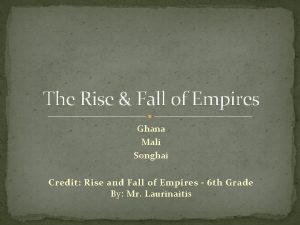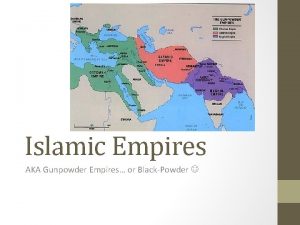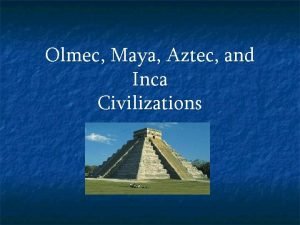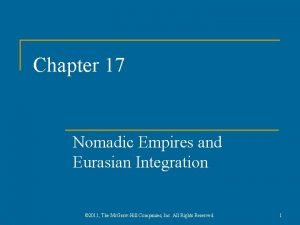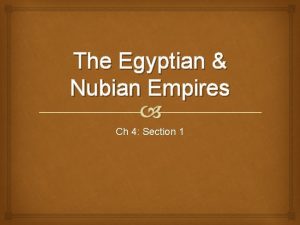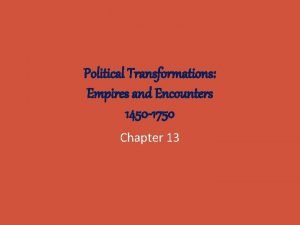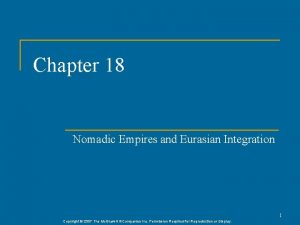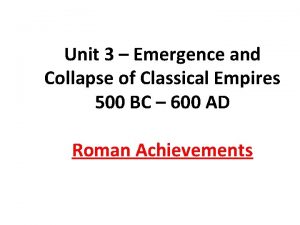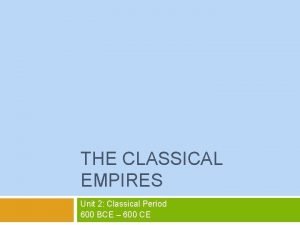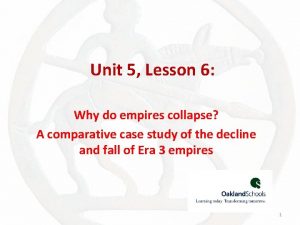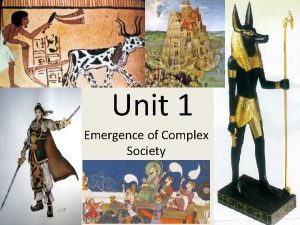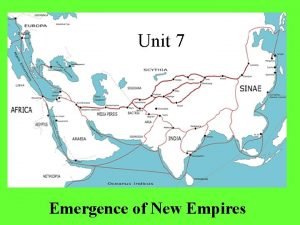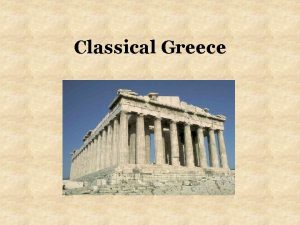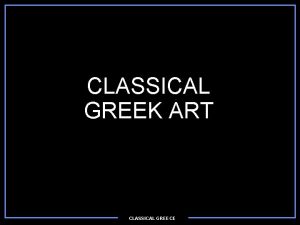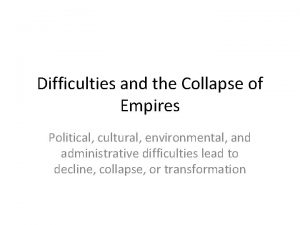Unit 3 Emergence and Collapse of Classical Empires





























- Slides: 29

Unit 3 – Emergence and Collapse of Classical Empires 500 BC – 600 AD Persian Empire

The Rise of Persia • The Persians based their empire on tolerance and diplomacy. They relied on a strong military to back up their policies. Ancient Persia is where Iran is today.

Persia is in Modern Day Iran

Persian Empire

Persian Leadership Persia under the Medes • Both Indo-European tribes • Medes conquered Persians • Persians allowed to keep their own leaders as long as they did not rebel Darius I • Crushed rebellion after death of Cyrus’s son • Strengthened army, empire • Ceremony and ritual • Created satraps to help govern Cyrus the Great • • Defeated Medes in 559 BC Expanded Persian Empire Freed Jews in Babylon Respected by those he conquered Persia in Decline • Rule of Darius high point of Persian culture • Son, Xerxes, failed to conquer Greece • Last strong ruler of Persia

Cyrus the Great (600 – 530 BC)

Cyrus’s Empire • 550 BC – Military genius, conquered several neighboring kingdoms • Controlled an empire spanning 2, 000 miles • Used the idea of tolerance to keep the peace and to seem like a liberator. Kindness toward conquered people and honored local customs and religions • 537 BC - The Jews called him “the anointed of the Lord. ” (In 537, he allowed over 40, 000 to return to Judah).

Primary Source • “This is the word of Cyrus, King of Persia: The Lord, God of heaven has given me all the kingdoms of the earth, and he himself has charged me to build him a house at Jerusalem in Judah. To every man of his people now among you I say, God be with him, and let him go up to Jerusalem in Judah, and rebuild the house of the Lord God of Israel, the God whose city is Jerusalem. ” Ezra 1: 2 -3 • What type of ruler was Cyrus based on this quote?

Darius (550 - 485 BC)

Darius the Great • Member of the king’s body guard (the immortals, 10, 000 strong) • Overthrew King Cambyses (Cyrus’ son) in 522 BC • Took power and created a well-organized efficient government • Brought peace and stability

Darius’s Empire • Built Persepolis (Capitol City of Persia) • Extended Persian Empire by 500 miles to Indus River (2 million sq miles) • Built a canal in Egypt • Established a tax-collecting system • Divided empire into districts called SATRAPIES • Built the great Royal Road system • Created a network of spies called “the King’s eyes and ears”

Capital City of Persepolis

Persepolis Darius I began the elaborate citadel; his son, Xerxes, continued its construction; and his grandson, Artaxerxes I, completed the magnificent city of Persepolis, which was a confluence of styles-Median, Mesopotamian, Egyptian, and Greek. Only portions of the audience hall remain. (George Holton/Photo Researchers, Inc. )

Persian Art Persepolis, Iran • Apadana with huge columns 60 feet tall • 36 columns with bull-shaped tops • Reliefs on walls symbolize Persian guards called Immortals • 10, 000 Immortals protected the city and ruler • Large ramps leading to apadana enable chariots to 14 enter hall

Royal Spies • They spied on the citizens and on the governors to make sure they were not going to steal or revolt.

Zoroastrianism During the reigns of Cyrus and Darius, a new religion called Zoroastrianism took hold, based on the teachings of Zoroaster. Teachings Spread • Monotheism • Much of Persian Empire • Ahura Mazda, source of good – went to heaven • Darius worshipped Ahura Mazda • Ahriman, evil spirit – went to hell • Other religions discouraged • Dualism = good and evil • The Greeks converted the Persians • Free will • • The Avesta Zoroastrianism never completely disappeared • End of time

Persian economy • Gold daric & silver shekels standardized • Royal Road: • 1677 miles from Sardis to Susa • “neither snow, nor rain, nor heat, nor darkness…” (Herodotus) • International trade

The Royal Road • 1, 677 miles long with 111 relay stations • Other smaller roads branched off the royal road • Relay stations had rest areas and fresh horses. • The entire royal road could be traveled in a week by a horsemen. Caravans took about a month


First Persian War

Battle of Marathon The Athenians had won at Marathon but they certainly had not destroyed the Persian army. They had made plans before the battle that if they won, they would get word back to Athens as soon as possible because they knew that the Persian fleet was sure to sail around Attica and attempt to take the city while it was undefended. The citizens were to man the walls and make it appear that Athens was strongly defended.

Result of the st 1 Persian War Darius Lost and Persia Continued to lose its power to expand

Xerxes (519 – 465 BC) • Became a Dictator • Did not follow Darius or Cyrus and was not tolerant • Wanted to conquer Greece at all cost

Second Persian War

Battle of Thermopylae (“Hot Gates”) • 300 Spartans held off 1 million troops of the Persian Empire • Was really a delaying action to stall the Persians so that Athens could be evacuated. • Tactical advantage because of choke point in the terrain.

Thermopylae


Persians eventually Broke Through • After killing the 300 Spartans the Persians Marched on Athens • Athens was deserted; evacuated to the Island of Salamis • The Athenians forced a naval battle in the Bay of Salamis

Result of the 2 nd Persian War Xerxes Lost and Persia had to retreat home in failure. Never again did Persia expand.
 Land based vs maritime empires
Land based vs maritime empires So&e
So&e Emergence theory
Emergence theory Lesson 2 the emergence of mass society
Lesson 2 the emergence of mass society Systemic game design
Systemic game design Speech emergence stage activities
Speech emergence stage activities Emergence of scaling in random networks
Emergence of scaling in random networks Speech emergence stage
Speech emergence stage Plan emergence madagascar 2019-2023 pdf
Plan emergence madagascar 2019-2023 pdf Emergence netflix
Emergence netflix Emergence of entrepreneurial class
Emergence of entrepreneurial class The emergence of new values
The emergence of new values Plan emergence madagascar 2019-2023
Plan emergence madagascar 2019-2023 Emergence profile
Emergence profile Paul ruthman committee
Paul ruthman committee The emergence of mass society
The emergence of mass society Failure of supporting utilities and structural collapse
Failure of supporting utilities and structural collapse Rise and fall of ghana
Rise and fall of ghana How did the ottoman safavid and mughal empires arise
How did the ottoman safavid and mughal empires arise Aztecs mayans incas
Aztecs mayans incas The policy of establishing colonies and building empires
The policy of establishing colonies and building empires Chapter 17 nomadic empires and eurasian integration
Chapter 17 nomadic empires and eurasian integration Chapter 17 nomadic empires and eurasian integration
Chapter 17 nomadic empires and eurasian integration Chapter 4 section 1 the egyptian and nubian empires
Chapter 4 section 1 the egyptian and nubian empires Political transformations empires and encounters
Political transformations empires and encounters Chapter 5 political transformations empires and encounters
Chapter 5 political transformations empires and encounters Gunpowder empires characteristics
Gunpowder empires characteristics Chapter 18 nomadic empires and eurasian integration
Chapter 18 nomadic empires and eurasian integration Chapter 17 nomadic empires and eurasian integration
Chapter 17 nomadic empires and eurasian integration Aztec farming
Aztec farming

















